When your central air conditioning system fails during Houston’s sweltering summer, it’s more than an inconvenienceit’s an urgent situation that affects your family’s comfort, health, and daily routine. Every year, homeowners face the challenge of deciding whether that strange noise, weak airflow, or complete system shutdown requires professional repair. Understanding the fundamentals of central air conditioning system repair empowers you to make informed decisions, avoid costly mistakes, and ensure your home stays comfortably cool when you need it most.
At 75 DegreeAC, we’ve served Houston homeowners since 2016, handling thousands of central AC repair cases ranging from simple fixes to complex system overhauls. This comprehensive guide draws from real-world experience to help you recognize warning signs, understand the repair process, and know exactly what to expect when your central air system needs attention.
Understanding Your Central Air Conditioning System
Before diving into repair specifics, it’s essential to understand what makes up your central air conditioning system. Unlike window units or portable ACs, central air systems are complex networks of components working together to cool your entire home efficiently.
Key Components of Central AC Systems
Your central air conditioning system consists of two primary units: an outdoor condenser and an indoor air handler or furnace. The outdoor unit houses the compressor, condenser coil, and fan, while the indoor unit contains the evaporator coil and blower. These components work in tandem, circulating refrigerant through a closed loop to extract heat from your home and release it outside.
The thermostat serves as the system’s brain, constantly monitoring indoor temperature and signaling when cooling is needed. Ductwork distributes cooled air throughout your home, while return vents pull warm air back to the system for cooling. Understanding this interconnected system helps you recognize where problems might originate when issues arise.
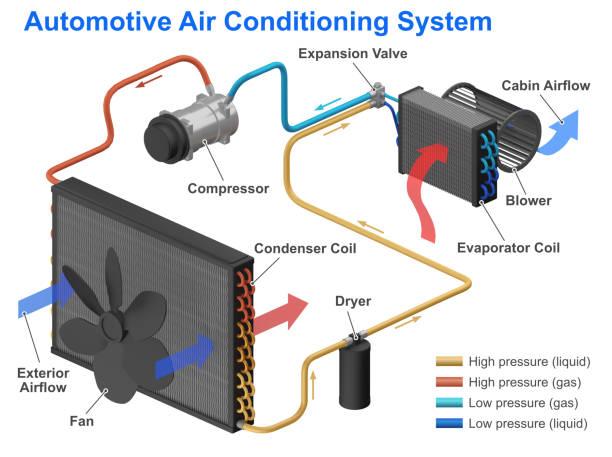
Warning Signs Your Central AC System Needs Repair
Recognizing early warning signs can prevent minor issues from escalating into costly emergency repairs. According to the U.S. Department of Energy, catching problems early can reduce repair costs by up to 40% and extend your system’s lifespan significantly.
Immediate Red Flags Requiring Professional Attention
- Complete system failure: If your AC won’t turn on at all, this indicates electrical issues, thermostat problems, or compressor failure requiring immediate diagnosis.
- Warm air from vents: When your system runs but produces warm air, you’re likely facing refrigerant leaks, compressor issues, or ductwork problems.
- Unusual noises: Grinding, squealing, or banging sounds signal mechanical failures, loose components, or motor problems that worsen rapidly if ignored.
- Water leaks around the unit: Pooling water indicates condensate drain blockages, frozen evaporator coils, or refrigerant leaksall requiring prompt repair.
- Frequent cycling: If your system turns on and off repeatedly, it’s short-cycling, which damages components and dramatically increases energy consumption.
- Spike in energy bills: A sudden 20-30% increase in cooling costs without increased usage indicates your system is working harder due to underlying problems.
Subtle Indicators Often Overlooked
Many homeowners miss early warning signs that seem minor but indicate developing problems. Weak airflow from certain vents suggests ductwork issues or blower motor problems. Musty odors when the AC runs indicate mold growth in ductwork or standing water in the drain pan. If some rooms stay warmer than others, you’re experiencing airflow imbalances requiring professional assessment.
Excess humidity indoors, even when the AC runs constantly, means your system isn’t properly dehumidifyinga core function of central air conditioning. These subtle signs often precede major failures, making them crucial for homeowners to recognize and address promptly.
Most Common Central Air Conditioning Repair Issues
Understanding the most frequent repair issues helps you anticipate potential problems and communicate effectively with HVAC technicians. Industry data from the Air Conditioning Contractors of America shows that these five issues account for approximately 80% of all central AC repair calls.
1. Refrigerant Leaks and Low Refrigerant Levels
Refrigerant is the lifeblood of your AC system, absorbing heat from indoor air and releasing it outside. Modern systems use R-410A refrigerant, which should never need “refilling” in a properly functioning system. If your refrigerant is low, you have a leak that must be located and repaired before recharging.
Signs of refrigerant issues include ice formation on refrigerant lines, hissing sounds near the outdoor unit, and significantly reduced cooling capacity. The Environmental Protection Agency requires certified technicians to handle refrigerant, as improper handling poses environmental and safety risks. Professional repair involves leak detection using specialized equipment, repair or replacement of damaged components, and proper refrigerant recharging to manufacturer specifications.
2. Electrical Component Failures
Electrical problems range from simple capacitor failures to complex control board malfunctions. Capacitors, which provide the electrical surge needed to start motors, fail frequently in Houston’s heat. When capacitors fail, the system won’t start, or motors run inefficiently, leading to premature failure.
Contactorselectrical switches that control power to major componentscan pit or burn out, preventing the system from operating. Circuit breakers trip repeatedly when electrical components draw too much current due to mechanical problems or failing motors. These electrical issues require professional diagnosis, as attempting DIY repairs poses serious safety risks and can void warranties.
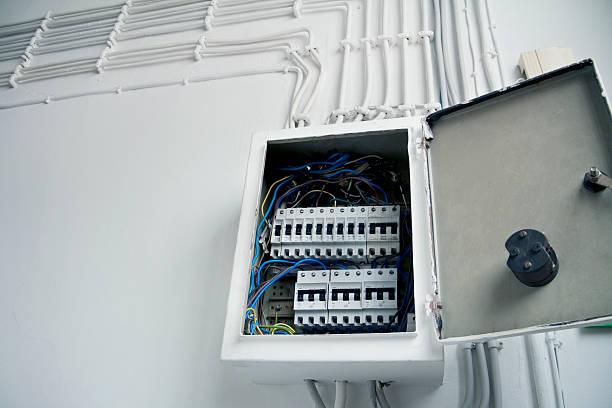
3. Frozen Evaporator Coils
Despite cooling your home, your AC’s evaporator coil can freeze solid, paradoxically causing your system to blow warm air or stop working entirely. This occurs when airflow across the coil is restricted, preventing proper heat absorption. Dirty air filters are the most common culprit, blocking airflow and causing temperature drops below freezing.
Other causes include closed or blocked vents, collapsed ductwork, low refrigerant levels, and failing blower motors. When coils freeze, the ice must be completely thawed before operation can resume. Simply thawing the coil without addressing the underlying cause guarantees the problem will recur, potentially causing water damage to your home.
4. Drainage System Problems
Your central AC removes humidity from indoor air, producing condensate that must drain properly. A clogged condensate drain line causes water to back up, triggering safety switches that shut down your system. In Houston’s humid climate, condensate drains handle significant water volume, making blockages common.
Algae and mold growth inside drain lines create slimy blockages that prevent drainage. Drain pans can rust through or crack, causing water leaks that damage ceilings and walls. Regular drain line maintenance prevents these issues, but once blockages occur, professional cleaning with specialized equipment ensures complete removal and prevents rapid recurrence.
5. Compressor Failures
The compressor is your AC system’s heart, pressurizing refrigerant and pumping it through the system. Compressor failure is among the most expensive repairs, often costing $1,500-$2,500 for replacement. Compressors fail due to electrical problems, refrigerant issues, contaminated refrigerant, or simply age-related wear.
Warning signs include hard starting (the unit struggles to begin operating), loud noises from the outdoor unit, and circuit breakers tripping immediately when the AC attempts to start. Given the high repair cost, many homeowners facing compressor replacement opt for complete system replacement, especially for units over 10-12 years old.
The Central AC Repair Process: What to Expect
Understanding the repair process eliminates anxiety and helps you work effectively with HVAC professionals. Professional central air conditioning system repair follows a systematic approach ensuring accurate diagnosis and lasting solutions.
Initial Diagnosis and Assessment
Reputable HVAC companies like 75 DegreeAC’s AC Repair services begin with comprehensive system evaluation. Technicians interview you about symptoms, recent changes, and system behavior. They then perform visual inspection of both indoor and outdoor units, checking for obvious damage, wear, or improper installation.
Using diagnostic equipment, technicians measure refrigerant pressures, electrical voltages, amperage draws, and airflow volumes. They test thermostats, safety controls, and system cycling. This thorough assessment typically takes 30-60 minutes and identifies root causes rather than just symptoms. Professional technicians provide detailed findings and repair recommendations before beginning work.
Repair Implementation
Once diagnosis is complete and you’ve approved recommended repairs, technicians implement solutions using manufacturer-approved parts and industry best practices. Simple repairs like capacitor replacement or filter changes complete quickly, often within an hour. Complex repairs involving refrigerant work, component replacement, or electrical troubleshooting may require several hours.
Throughout the repair process, experienced technicians protect your home with drop cloths, wear shoe covers, and maintain clean work areas. They explain what they’re doing and why, ensuring you understand the repairs being performed. At 75 DegreeAC, we provide upfront pricing with no hidden fees, so you know exactly what repairs will cost before work begins.
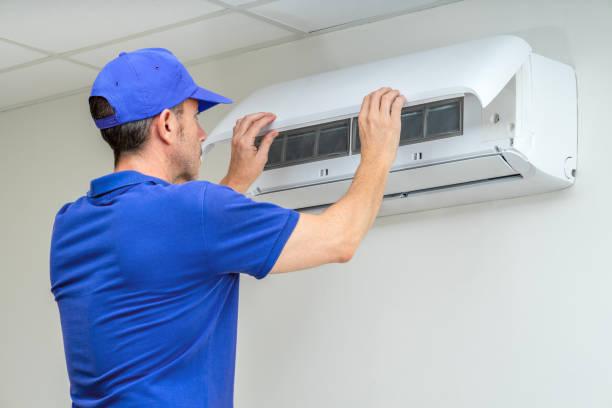
Testing and Verification
After completing repairs, professional technicians thoroughly test system operation. They verify proper refrigerant charge using superheat and subcooling measurements, check electrical connections for secure operation, measure airflow at multiple vents, and monitor system cycling. They ensure the thermostat controls the system correctly and all safety features function properly.
This post-repair testing confirms the problem is fully resolved and the system operates at peak efficiency. Technicians document all measurements and test results, providing you with records of your system’s condition after repair.
Central Air Conditioning System Repair Costs
Repair costs vary widely based on the problem’s nature, required parts, and labor complexity. Understanding cost factors helps you budget appropriately and recognize fair pricing versus overcharging.
Average Repair Cost Ranges
| Repair Type | Typical Cost Range | Repair Duration |
|---|---|---|
| Thermostat Replacement | $150 – $400 | 1-2 hours |
| Capacitor Replacement | $150 – $350 | 30 minutes – 1 hour |
| Contactor Replacement | $150 – $400 | 1-2 hours |
| Refrigerant Leak Repair & Recharge | $400 – $1,500 | 2-4 hours |
| Blower Motor Replacement | $450 – $800 | 2-3 hours |
| Evaporator Coil Replacement | $800 – $1,500 | 4-6 hours |
| Compressor Replacement | $1,500 – $2,500 | 4-8 hours |
| Condenser Fan Motor | $300 – $600 | 1-3 hours |
Factors Affecting Repair Costs
Several variables influence final repair costs beyond the basic component price. System age affects parts availability and labor complexityolder systems often require more extensive work. Brand and model impact parts costs, with premium brands typically commanding higher prices. System size matters, as larger capacity units use more expensive components.
Emergency service timing significantly affects costs. Standard business hours repairs cost less than evening, weekend, or holiday emergency calls. However, addressing problems promptly often prevents more expensive damage, making emergency service worthwhile when needed.
DIY Repairs vs. Professional Service
While some maintenance tasks are homeowner-friendly, most central air conditioning system repairs require professional expertise, specialized tools, and EPA certification for refrigerant handling.
Safe DIY Maintenance Tasks
Homeowners can safely perform certain maintenance tasks that prevent problems and reduce repair frequency. Regular filter changesmonthly during heavy use periodsmaintain proper airflow and prevent frozen coils. Keeping outdoor units clear of debris, vegetation, and obstructions ensures adequate airflow and prevents overheating.
Cleaning condensate drain lines with vinegar or bleach solutions prevents algae buildup. Ensuring all vents remain open and unobstructed maintains proper system balance. Programmable thermostat adjustment optimizes comfort and efficiency. These simple tasks prevent many common problems without risking damage or safety issues.
When Professional Service Is Essential
Federal law requires EPA certification for anyone handling refrigerant, making DIY refrigerant work illegal and potentially dangerous. Electrical repairs risk electrocution, fire, and property damage without proper training and safety procedures. Misdiagnosed problems lead to incorrect repairs, wasted money, and potentially greater damage.
Modern AC systems use sophisticated electronics and controls that require diagnostic equipment and training to troubleshoot accurately. Warranty coverage often requires professional installation and serviceDIY repairs typically void manufacturer warranties. When repair needs arise beyond basic maintenance, professional service from companies like 75 DegreeAC ensures safe, effective, lasting solutions.
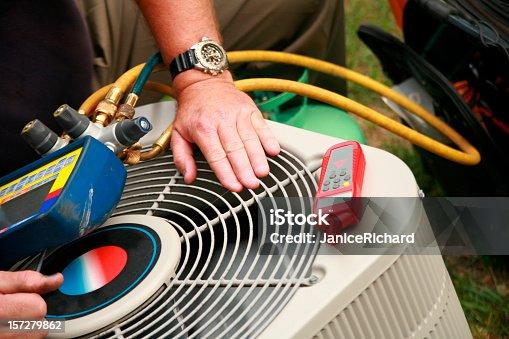
Preventive Maintenance: Reducing Repair Frequency
The most effective repair strategy is preventing problems before they occur. Regular preventive maintenance dramatically reduces repair frequency, extends equipment life, and maintains peak efficiency.
Professional Maintenance Plans
Annual or bi-annual professional maintenance visits identify developing problems before they cause failures. During maintenance visits, technicians clean coils, check refrigerant levels, test electrical components, lubricate moving parts, and verify proper system operation. Studies show regular maintenance reduces repair costs by 30-50% over the system’s lifetime while extending operational life by 5-10 years.
At 75 DegreeAC, our maintenance plans provide scheduled service, priority scheduling, and discounted repair rates. This proactive approach catches minor issues during routine visits rather than emergency situations, saving money and preventing uncomfortable breakdowns during peak cooling season.
Seasonal Preparation
Preparing your system for cooling season prevents common startup problems. Spring tune-ups ensure your AC is ready for summer’s demands, while fall preparation protects components during Houston’s milder months. This seasonal approach aligns maintenance with system demands, optimizing performance when you need it most.
Repair vs. Replacement: Making the Right Decision
When facing significant repairs, homeowners often wonder whether repairing makes financial sense or if replacement is more practical. Several factors guide this critical decision.
The 50% Rule and Age Consideration
Industry professionals use the “50% rule” as a guideline: if repair costs exceed 50% of a new system’s cost and your unit is past half its expected lifespan, replacement often makes better financial sense. Central AC systems typically last 15-20 years with proper maintenance. A 12-year-old system requiring $2,000 in repairs might warrant replacement, while a 5-year-old system with the same repair need should likely be fixed.
Efficiency and Operating Cost Considerations
Newer systems offer significantly improved efficiency compared to units over 10 years old. A modern 16-SEER system uses approximately 30% less energy than an older 10-SEER unit. While system replacement requires upfront investment, monthly energy savings offset this cost over time, typically providing payback within 5-7 years.
Factor in potential repair frequency for aging equipment. Older systems often require repeated repairs, creating ongoing expense and inconvenience. New systems include warranties covering parts and labor for several years, providing peace of mind and predictable costs.
Choosing the Right Central AC Repair Company
Selecting a qualified, trustworthy repair company significantly impacts repair quality, cost, and overall experience. Several key factors distinguish professional companies from subpar operators.
Essential Qualifications and Credentials
Verify proper licensingTexas requires HVAC contractors to hold appropriate licenses for the work they perform. Insurance coverage protects you from liability if accidents occur during service. EPA certification is mandatory for refrigerant handling, ensuring technicians follow proper procedures and environmental regulations.
Experience matters significantly in HVAC repair. Companies with several years in business demonstrate staying power and customer satisfaction. Look for technicians with manufacturer-specific training and certifications, indicating expertise with your particular system brand.
Pricing Transparency and Service Approach
Reputable companies provide detailed written estimates before beginning work, explaining what repairs are needed and why. Avoid companies offering only vague “ballpark” figures or refusing to provide estimates without payment. Clear pricing with no hidden fees protects you from surprise charges.
Professional companies diagnose problems thoroughly rather than jumping to conclusions or pushing unnecessary repairs. They explain findings in understandable terms, provide repair options when available, and respect your decision-making authority. At 75 DegreeAC, we believe informed customers make better decisions, so we take time to ensure you understand your system’s condition and repair options.
Customer Reviews and Reputation
Online reviews provide valuable insights into company reliability, quality, and customer treatment. Look for consistent patterns in reviews rather than isolated comments. Companies with hundreds of positive reviews demonstrate sustained quality service. Pay attention to how companies respond to negative reviewsprofessional, solutions-oriented responses indicate commitment to customer satisfaction.
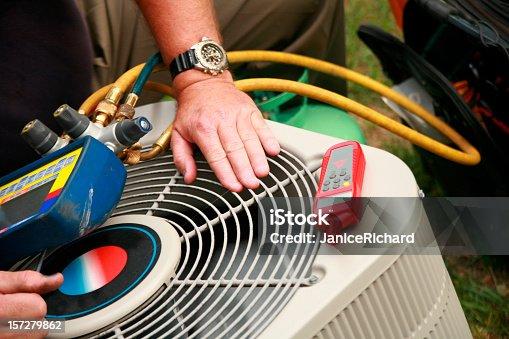
Emergency Repair Situations
Some AC problems constitute true emergencies requiring immediate attention, while others can wait for standard business hours. Understanding the difference helps you respond appropriately and avoid unnecessary emergency service charges.
True Emergency Scenarios
Complete system failure during extreme heat (above 95°F) creates dangerous conditions, especially for elderly residents, young children, or those with health conditions. Electrical issues producing burning smells, smoking, or repeated breaker trips pose fire risks requiring immediate shutdown and service. Water leaks causing property damage need urgent attention to prevent further harm.
Refrigerant leaks producing hissing sounds and visible escaping gas require immediate shutdown and professional service due to safety and environmental concerns. For these situations, 24/7 emergency service from qualified companies like 75 DegreeAC ensures rapid response and resolution.
Non-Emergency Issues
Reduced cooling capacity during moderate weather, unusual but non-threatening noises, minor efficiency decline, and thermostat programming issues typically don’t require emergency service. These problems warrant attention but can usually wait for standard business hours appointments, saving emergency service premiums while still addressing issues promptly.
Summary: Key Takeaways for Houston Homeowners
Central air conditioning system repair requires understanding your system’s components, recognizing warning signs, and partnering with qualified professionals for diagnosis and service. Regular preventive maintenance prevents most repairs while extending equipment life and maintaining efficiency. When problems arise, prompt professional attention prevents minor issues from becoming major failures.
The repair vs. replacement decision depends on system age, repair costs relative to replacement costs, and ongoing reliability expectations. Choosing a qualified, experienced repair company ensures quality work, fair pricing, and lasting solutions. While some maintenance tasks are DIY-appropriate, most repairs require professional expertise, specialized equipment, and legal certification.
Houston’s demanding climate places significant stress on central AC systems, making professional service particularly important. Companies with local experience understand regional challenges and provide targeted solutions for Houston-specific conditions.
Get Expert Central AC Repair Service Today
Don’t let AC problems compromise your comfort or escalate into expensive emergencies. At 75 DegreeAC, our licensed, experienced technicians provide fast, reliable central air conditioning system repair throughout Houston and surrounding areas. With upfront pricing, same-day service availability, and a commitment to quality workmanship, we’re Houston’s trusted choice for AC repair.
Contact 75 DegreeAC at (713) 598-2737 for immediate assistance or to schedule service. Our team is ready to diagnose your system accurately, explain findings clearly, and implement lasting repairs that restore your comfort quickly. Whether you need emergency repair, routine maintenance, or expert guidance on repair vs. replacement decisions, we’re here to help with honest, professional service you can trust.
Visit our website to learn more about our comprehensive AC repair services, maintenance plans, and installation options. Experience the difference that local expertise, professional service, and genuine customer care make.
Frequently Asked Questions
How often should central AC systems be professionally serviced?
Central air conditioning systems should receive professional maintenance at least once annually, ideally in spring before cooling season begins. In Houston’s demanding climate with extended cooling seasons, bi-annual service (spring and fall) provides optimal protection and performance. Regular maintenance prevents approximately 85% of repairs and extends equipment life significantly.
What’s the average lifespan of a central AC system?
With proper maintenance, central air conditioning systems typically last 15-20 years. However, factors like usage intensity, maintenance quality, installation quality, and climate conditions significantly impact longevity. Houston’s year-round cooling demands may reduce lifespan slightly compared to milder climates. Systems receiving regular professional maintenance consistently outlast neglected units by 5-10 years.
How can I reduce my AC repair costs?
Reduce repair costs by changing filters monthly during heavy use, scheduling annual professional maintenance, addressing small problems promptly before they escalate, keeping outdoor units clear of debris, and ensuring proper thermostat operation. Maintenance plans from companies like 75 DegreeAC provide discounted service rates and priority scheduling, reducing overall ownership costs significantly.
Is it worth repairing an old AC system?
Repair worthiness depends on system age, repair cost, and expected remaining lifespan. For systems under 10 years old, repairs typically make sense unless costs approach 50% of replacement cost. Systems over 15 years old with major component failures often warrant replacement, especially considering improved efficiency in modern units. Consult with experienced technicians who can provide honest guidance based on your specific situation.
Why is my AC running but not cooling properly?
Several issues cause reduced cooling: low refrigerant from leaks, dirty or blocked air filters restricting airflow, frozen evaporator coils, failing compressor, dirty condenser coils, or ductwork leaks. Professional diagnosis identifies the specific cause, as multiple issues may contribute simultaneously. Attempting to troubleshoot complex cooling problems without proper training and equipment often leads to misdiagnosis and wasted money.
Can I operate my AC with a refrigerant leak?
No, you should not operate your AC with a refrigerant leak. Low refrigerant causes the compressor to work harder, potentially causing permanent damage. Leaking refrigerant is environmentally harmful and can create safety concerns. Federal law requires proper refrigerant handling by certified technicians. If you suspect a leak, turn off your system and contact professionals immediately for leak detection and repair.
What’s included in a typical AC repair service call?
Professional AC repair service includes diagnostic evaluation to identify problems, detailed explanation of findings, upfront cost estimates for recommended repairs, implementation of approved repairs using quality parts, thorough testing to verify proper operation, and documentation of work performed. Reputable companies provide warranties on labor and parts, ensuring your investment is protected.
How quickly can emergency AC repairs be completed?
Emergency repair completion time depends on problem complexity and parts availability. Simple issues like capacitor replacement or thermostat problems often resolve within 1-2 hours. Complex problems requiring specialty parts or extensive work may require longer, though many repairs complete same-day. At 75 DegreeAC, we stock common parts on our service vehicles and maintain relationships with suppliers for rapid parts access when needed.
